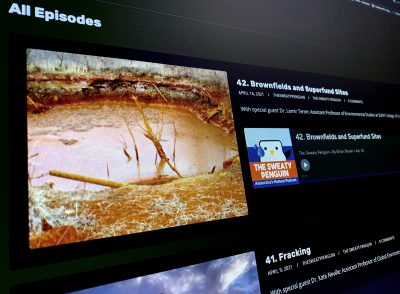
Boston University has offered several Earth Day activities for students to participate in this week, including virtual events with BU Sustainability and BU Libraries, social media discussions and more.
Lisa Tornatore, the sustainability director of BU Sustainability, wrote in an email the organization’s plans for Earth Week were consistent with issues they have been working to address.
“Our focus this year will be on Environmental Justice and Zero Waste,” she wrote. “Two initiatives that will continue to be a focus for our organization in the coming months.”
As part of a four-part series on environmental justice virtual events that began in the Fall semester, the final panel discussion titled “Exploring Environmental Justice: Energy Justice in the Boston Area” Wednesday included policy experts and local community organizers, Tornatore wrote.
BU Sustainability’s Zero Waste Manager Kaity Robbins and Zero Waste Intern Maddy Scully will additionally be holding an Instagram Live discussion Friday from 1 p.m. to 2 p.m.
WBUR, BU Initiative on Cities, BU Libraries and student organizations are also hosting Earth Day-themed activities as well, Tornatore wrote.
Diana Ceballos, an assistant professor in the School of Public Health, is speaking at a Wikipedia Edit-a-Thon organized by BU Libraries Thursday. The virtual event will focus on topics related to environmental health.
The Edit-a-Thon is open to the public, and all participants will be provided with the training and resources necessary for successful Wikipedia editing.
Ceballos said she hopes the event will inspire undergraduates to learn more about environmental health while also providing people the skills to be volunteer Wikipedia editors.
“It’s a great way to serve the scientific community and the general public with disseminating scientific information,” Ceballos said.
She added there are many Wikipedia pages on topics related to environmental health that could be improved and expanded upon.
“You may find what nail polish is, right, but you may not find the implications on health or implications on users,” Ceballos said. “But in terms of … how that relates to your health, that is a little bit harder to find detail.”
Ceballos often gives her students Wikipedia editing assignments, she said, citing one student who pursued “blue spaces,” or areas dominated by water, as her topic.
“The page had pretty much just the bare definition, like a dictionary, and had nothing else, and she converted into this whole developed page where she talks about examples of blue spaces,” Ceballos said. “You can pick something and always make it more interesting.”
Ethan Brown, a senior in the College of Communication, hosts The Sweaty Penguin, a comedic environmental podcast aiming to “depoliticize environmental issues and make them more accessible and fun.”
Since its launch in April 2020, Brown’s podcast has partnered with PBS’s national multiplatform climate initiative Peril and Promise.
Last week, the collaboration resulted in a special Earth Day episode discussing brownfields and Superfund sites — toxic waste sites with severe health and environmental impacts.
“These sites are disproportionately located in low-income and marginalized communities, Black and Latino communities, communities for whom English isn’t a first language,” Brown said. “That’s one of the big environmental injustices we see.”
He noted the problem has been worsened by climate change and the increased frequency of natural disasters in recent years.
“When you have extreme weather events like a hurricane or flood or a wildfire and it runs through a brownfield, then the toxins will spread into the community,” he said, “which obviously creates a lot of harmful health effects.”
Brown cited the global surge of vanilla prices in 2018 as an example of how climate change affects everyone, which he said was “one of the most interesting episodes” the podcast had hosted.
“Madagascar got hit by a cyclone, which wiped out a large chunk of the world’s vanilla crop and the price skyrocketed,” he said. “There’s this volatility that’s happening all the time.”
Brown added climate change affects much more than people tend to realize.
“Climate change isn’t a future problem anymore,” Brown said. “I think seeing how climate change impacts things that we interact with on a regular basis certainly makes it feel a little closer to home.”
Brown said he aims to teach listeners regardless of their political views, because environmental issues affect everyone and must be addressed.
“I think a lot of times with the way political polarization is today people aren’t on the same page as to what the environmental problems are,” Brown said. “If we agreed on what the problems are and we were debating solutions, that would be much more productive and lead to more environmental progress.”























































































































